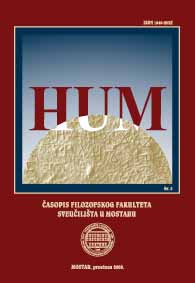RASPAD TEODICEJE U PROMIŠLJANJIMA A. SCHOPENHAUERA I F. NIETZSCHEA
DOWNFALL OF THEODICY IN A. SCHOPENHAUER AND F. NIETZSCHE’S DELIBERATIONS
Author(s): Ivan ŠevoSubject(s): Philosophy
Published by: Filozofski fakultet Sveučilišta u Mostaru
Keywords: theodicy; pathodicy; pessimism; nihilism; world; man; superman; God; suffering; evil; value; mind; will; freedom; power.
Summary/Abstract: One of important A. Schopenhauer and F. Nietzsche’s philosophy thoughts is downfall of theodicy which has its roots in Post-Hegel’s philosophy, as well as in Charles Darwin’s theoretical percepts. Schopenhauer thinks that the world is endless suffering and that there is no final goal or highest value. In that way theodicy becomes pathodicy, which is against multiple suffering as theodicy. Nietzsche took over the main Schopenhauer’s percepts and from pessimism he ended in nihilism. He considers world as an unstoppable emergence and disappearance which lasts continually and with much struggle. Besides that, world is for him a great chaos which arises from case and need. There is nothing outside the world, there is no transcendence, because God is dead. Justification of God against evil and suffering becomes superfluous and theodicy impossible and absurd.
Journal: Hum
- Issue Year: 2009
- Issue No: 5
- Page Range: 240-263
- Page Count: 24
- Language: Croatian

